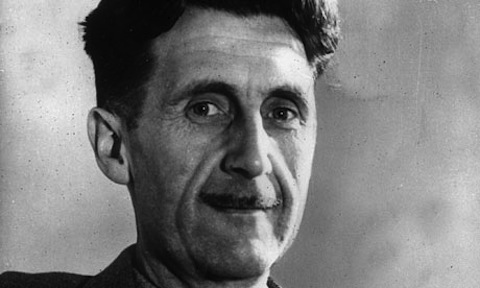
Journalist and novelist Eric Blair, known for all of his professional life by the pen name George Orwell, staunchly identified himself as a democratic socialist. For example, in his slim 1946 publication Why I Write, he declared, “Every line of serious work I have written since 1936 has been written, directly or indirectly, against totalitarianism and for democratic socialism as I understand it.” Despite the widespread blurring of lines these days between socialism and communism—whether through ignorance or deliberate misleading—the distinction was not lost on Orwell. Though he supported an equitable distribution of wealth and public institutions for the common good, he fiercely opposed Soviet communism as anti-democratic and oppressive. As Orwell biographer John Newsinger writes, one “crucial dimension to Orwell’s socialism was his recognition that the Soviet Union was not socialist. Unlike many on the left, instead of abandoning socialism once he discovered the full horror of Stalinist rule in the Soviet Union, Orwell abandoned the Soviet Union and instead remained a socialist.”
Of course, Orwell’s anti-communist sentiments are familiar to every student who has read Animal Farm. Less well known is the degree to which he contributed to anti-communist propaganda, even corresponding with British secret services and keeping a blacklist of writers he deemed either “cryptos” (secret communists), “fellow travellers” (communist sympathizers), or outright members of the Communist Party. Orwell’s involvement with the Information Research Department (IRD), a propaganda unit formed in 1948 under the UK’s Foreign Office to combat Stalinism at home and abroad has received a good deal of attention in the past few decades, in part because of the discovery in 2003 of a private notebook containing his original list. Even before this revelation, biographers and historians had known about the list, which Orwell included, in part, in a letter to his love interest Celia Kirwan, who worked for the IRD, with the instructions that she keep it secret due to its “libelous” nature. Orwell intended that the writers on the list not be asked to work for the IRD because, in his estimation, they were people who could not be trusted.
Reactions to Orwell’s list have been very mixed. When the story first broke in the late nineties, Orwell’s longtime friend Michael Foot said he found the list “amazing” and out of character. One of the people named, Norman Mackenzie, ascribed the list to Orwell’s illness, saying that the writer was “losing his grip on himself” in 1949 during his final struggle with the tuberculosis that killed him that year. Orwell biographer Bernard Crick defended his actions, writing, “He did it because he thought the Communist Party was a totalitarian menace. He wasn’t denouncing these people as subversives. He was denouncing them as unsuitable for counter-intelligence operation.” On the other hand, late leftist firebrand journalist Alexander Cockburn condemned Orwell as a “snitch” and thought the list was evidence of Orwell’s bigotry, given his suspicion of Paul Robeson as “anti-white” and his denouncing of others due to their rumored homosexuality or Jewish background. He makes a compelling case. Whatever Orwell’s motivations, the effect on the named individuals’ professional and political lives was mild, to say the least. This was hardly a McCarthyite witch-hunt. Nonetheless, it’s a little hard for admirers of Orwell not to wince at this collaboration with the state secret service.
Below, see the list he submitted to Kirwan in his letter. Further down is a list of names, including those of Orson Welles and Katherine Hepburn, that appeared in his notebook but not on the list he gave to the IRD.
Writers and journalists
- “Aldred,” novelist (first name unknown)
- John Anderson, journalist, Industrial correspondent for Manchester Guardian
- John Beavan, editor
- Arthur Calder-Marshall, writer
- H. Carr, historian
- Isaac Deutscher, former Trotskyist writer, correspondent for The Economist and The Observer (1942–1947)
- Cedric Dover, journalist
- Walter Duranty, New York Times Moscow correspondent
- Douglas Goldring, novelist
- “Major Hooper”, writer on military history
- Alaric Jacob, Moscow Correspondent for the Daily Express during the Second World War
- Marjorie Kohn, journalist
- Stefan Litauer, journalist
- Norman MacKensie, historian and a founding member of the SDP
- Kingsley Martin, editor of the New Statesman
- Hugh McDiarmid, poet and Scottish nationalist
- Naomi Mitchison, novelist
- Nicholas Moore, poet
- Iris Morley, Moscow Correspondent for The Observer during the Second World War
- Neumann, novelist
- George Padmore, Trinidadian journalist and anti-imperialist campaigner
- Ralph Parker, journalist, News Chronicle
- B. Priestley, novelist and playwright
- Peter Smollett, Daily Express journalist later identified as a Soviet agent, Smolka recruited by Kim Philby.
- Margaret Stewart, industrial/labour correspondent
- Alexander Werth, journalist
Academics and scientists
- Patrick Blackett, physicist
- Gordon Childe, archaeologist
- John Macmurray, philosopher
- Tibor Mende, Foreign Affairs analyst
- G. Crowther, The Guardian’s first science correspondent
Actors
Labour MPs
Others
- Joseph Macleod
- Peadar O’Donnell, Irish socialist
- The Reverend Leonard Schiff, clergyman
- Commander Edgar Young
People named in Orwell’s notebook, but not appearing on the final IRD list:
- Bessie Braddock, Labour MP
- Alex Comfort, pacifist writer
- Nancy Cunard, heiress and left-wing activist
- Katharine Hepburn, actress
- Harold Laski, economist
- Cecil Day-Lewis, poet.
- Alan Nunn May, scientist
- John Platts-Mills, Labour MP
- Sean O’Casey, playwright
- George Bernard Shaw, playwright
- John Steinbeck, novelist
- Randall Swingler, poet
- Stephen Swingler, Labour MP
- J. P. Taylor, historian
- Orson Welles, film director
- Solly Zuckerman, scientist
Related Content:
George Orwell Explains in a Revealing 1944 Letter Why He’d Write 1984
George Orwell Reviews Mein Kampf (1940)
Josh Jones is a writer and musician based in Durham, NC. Follow him at @jdmagness


Once again the pygmies labour so that there shall be no giants…
“Aldred” is Guy Aldred, left-wing author
Orwell was closer to O’Brien than he was to his delusional vanity project version of himself limned in Winston Smith.